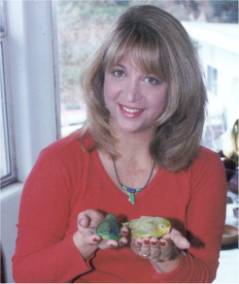My little Lily (my parrotlet) has layed an egg and ate the shell, what
does this mean? Also do you sell catalogs, articles or any kind of
monthly subscriptions for the Parrotlet?
Dear Anthony:
Thank you for your email. Although not as prevalent as is seen in cockatiel hens, pet parrotlets kept as single pets can produce eggs without a mate. The egg, of course, is infertile and won't hatch but Nature will cause her to cycle as if it were. I can't tell you why the bird laid an egg since I don't have any information as to her age, how she is kept, what kind of diet she has, if there are other birds around, how many hours of daylight she is exposed to or if there are nests or nest-like structures in her cage. However, I can explain the behavior and how to best to deal with it.
Generally speaking, a hen that is producing eggs almost always is being exposed to too many hours of daylight. I recommend that you cover her cage at night to ensure darkness and limit her hours of daylight exposure to no more than 12, 10 is better. I uncover my pets at 8 AM and cover them at night at 8 PM. They don't sleep all that time but the reduction in daylight hours will affect their hormone production. My breeding pairs have lights that are on timers and they are scheduled to be on 14 hours a day. The 14 hour days, just like with wild birds, will cause hormone production to occur and get them ready for breeding.
Make sure she has access to lots of calcium both in the form of supplements and in calcium rich foods in her diet. Supplements such as calcium powder should be sprinkled on her fresh foods every other day. Also make sure that cuttlebone and mineral block are available at all times. Many hens consume great amounts of cuttlebone when they are laying eggs to replenish the calcium lost in the development of the eggs. Mineral blocks will make sure she has the necessary trace minerals if needed.
Foods that are rich in calcium and excellent to feed to parrotlets are broccoli, green leafy vegetables such as bok choy and chard and nuts like almonds.
Be sure and remove all nest-like structures from her cage. This could be anything from an actual nest to 'tents' or 'houses' designed for birds. Some hens will burrow under a feed cup (in which case they should be replaced with dishes that cannot allow access under it).
Your hen may or may not continue to lay eggs. If she does, it will probably be every other day or so. Do not remove the eggs or she will continue to lay eggs to replace the ones that were removed. This is bad as it can cause her to completely deplete her body of calcium and lead to a very dangerous condition called 'egg binding' where she cannot pass the egg and it has to be removed usually by surgery which parrotlets often do not survive. The best thing to do is to leave her alone, let her brood (sit) on her eggs, reduce her daylight hours, remove the nest-like structures and give her lots of calcium. When her cycle has been completed, she will abandon the eggs and you can then remove them. There is no set period of time for brooding infertile eggs - she may not do it at all or she may sit for the entire 3 weeks it takes for a parrotlet egg to hatch.
During this period of time, your hen may be much more moody and nippy. This is because of her hormones and her instinct to protect her offspring. It is completely natural and will pass once she gets through the egg laying and brooding cycle. Just be patient and not push her when she does not wish to be handled.
I hope you try the suggestions I have given. Laying eggs is a natural process for birds to that in and of itself should not hurt her if she is a normal, healthy adult bird. However, excessive egg laying can be a very dangerous condition and in a pet parrotlet it is unnecessary since she will not be able to produce chicks without a mate. Btw, this is NOT an indication she 'wants to breed' or prefers to be with a male. It is just a normal process brought about by artificial conditions.
As for the International Parrotlet Society, we are an non-profit educational organization that helps people take better care of their parrotlets whether they are keeping breeders or pets. We also raise funds for veterinary and nutritional projects and support conservation and preservation of rare and endangered species of parrotlets. We produce a bimonthly journal which is full of informative tips on disease control, behavior, training, new color mutations, rare species, showing and just about anything that has to do with parrotlets.
I hope this helps and best of luck with your bird!
Sincerely yours,
Sandee L. Molenda, C.A.S.
Secretary, International Parrotlet Society
Subscribe to:
Post Comments (Atom)




No comments:
Post a Comment
Note: Only a member of this blog may post a comment.